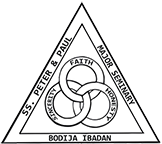On the 9th of October, 2021, the Holy Father declared a synod for the Universal Church that will run through to 2023. As a way of participating in the synodal process, the Seminary community organized a symposium on Synod 2021 – 2023: “For a Synodal Church”. This symposium was held on the 22nd of February, 2022, as part of the inter-semester activities and was moderated by Rev. Fr. Emmanuel Eseola of the Archdiocese of Ibadan. Six papers were presented by different student speakers (seminarians).
Fr. Emmanuel Eseola opened the discussion by tracing the history of synodality to the early Church. He affirmed that the idea of synodality has biblical roots and has been an integral part of the Church’s self understanding. He further explained that synod means journeying or travelling together and listening to one another for the progress of the Church. Synods, according to him, aim to foster a lived experience of discernment and participation and have as its end evangelization. The synodal process is about communion.
In presenting their papers, the speakers highlighted various aspects that are vital to the synodal process and the purpose it aims to achieve. The first speaker, Mr. Onuorah Henry, spoke on “The Role of Family and Basic Christian Communities in the Mission of the Church”. He said that the family should concretize the gospel message in the heart. He recommended daily family prayers, explanation of homilies to children, discussions about the faith and extension of charity to others outside the family, as ways the family can participate in the mission of the Church. He further stressed the need for journeying together of different families in the form of Basic Christian Communities. This should be extended to Christians of other denominations. Mr. Nobatu Cletus, who was the second speaker, delivered a paper titled: “The Co-responsibility of Clergy and Laity: A Paradigm of a Synodal Church”. He outlined ways by which the clergy and the laity can foster a synodal Church by being responsible to each other. In a similar vein, due attention was also given to the teeming youth population in the Church by Mr. Emmanuel Ikpobu, when he spoke on the “Participatory Roles of Youths and Pious Organizations in the Church’s Mission.” Mr. Emmanuel Ikpobu stressed that the vitality and creativity of the youth can promote the Church’s mission through outreach aided by pious societies, sports and social media.
Speaking from a political perspective, the fourth speaker, Mr. Fidelis James, emphasized the need for “The dialogue of the Church and the State”. He stressed that the Church exists in the State and the activities of the State positively or negatively affect the Church and her members. Therefore, the Church cannot but be involved in the affairs of the State. Church documents, the activities of Justice and Peace Development Commission, and diocesan Catholic newspapers must function as media for this synodal interaction between the Church and State. On his part, Mr. Solomon Okeke called for a better appreciation of the value of the synodal Church in his paper titled: “Collegiality in the Hierarchy of the Church”. Finally, Mr. Bitrus Ayuba presented a paper titled: “Consecrated Life and Synodality of the Church”. He described the consecrated life as a state of life characterized by the profession of the evangelical counsels of poverty, chastity and obedience. He enumerated ways in which people of the consecrated life can be involved in the synodal mission of the Church. The plethora of questions and contributions by the seminarians which followed after the presentations alluded to the interesting and educating nature of the symposium.
See Other News & Events »









